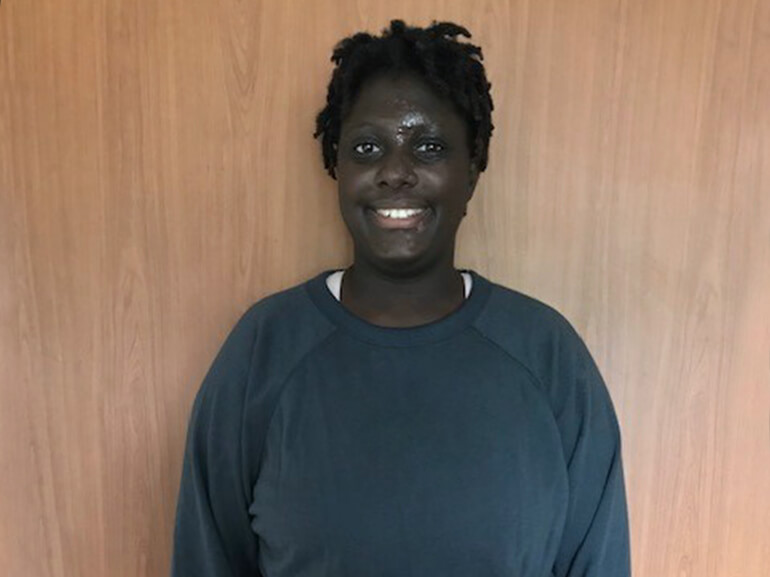Laneisha's story

Laneisha “Neisha” Jackson, 23, lives in St. Louis and is a mother of four who works two part- time jobs. On a spring day, she was driving someone home when she was in a car accident that turned into a seven-car pileup. Neisha was rushed to Barnes Hospital where it was determined that she had suffered a brain injury. She also required surgery to her nose and one of her eyes. Her brain injury made it difficult to walk, speak and remember things clearly. Neisha was also very sensitive toward light and sound, which caused her pain.
After a week of post-surgery recovery, Neisha transferred to SSM Health Rehabilitation Hospital – Bridgeton. Upon admission, she required assistance with walking, bathing, memory and most other activities of daily living. Neisha was also suffering from apraxia, where the brain is unable to make and deliver correct movement instructions to the body. Specifically, Neisha had apraxia of speech, meaning that her brain injury was making it difficult for her to perform the lip, jaw and tongue movements in order to speak clearly and to chew her food. Neisha’s goals for rehab included improving her walking, speech and memory.
Neisha’s physician-led team, including nurses as well as physical, occupational and speech therapists, worked to develop a care plan that would help reach her goals. In physical therapy, Neisha worked with her team on walking by using a rolling walker with assistance, eventually progressing to walking 300 to 400 feet at a time without an assistive device and minimal assistance. Therapists also guided Neisha in using the stairs, first with assistance, and then, as her balance improved, more independently. Additionally, the staff worked on her balance by walking outside on various surfaces (grass, mulch, pebbles, rocks, etc.) and completing two tasks at one time, which challenged her both physically and cognitively. Because being able to get down on the floor to play with her children was important to Neisha, therapists worked with her to practice getting down and up from the floor safely.
In occupational therapy, Neisha and her therapists focused on increasing strength and coordination in her arms and improving independence and safety with her activities of daily living, including personal care, cooking and cleaning. Because Neisha’s ability to care for her young children was so important, therapists worked on her ability to multitask in different environments with distractions to better prepare her for returning to life with her kids.
Speech therapists worked with Neisha on exercises and techniques to improve her memory, multi-tasking, speech and swallowing. Upon arriving at SSM Rehabilitation Hospital, Neisha could only eat a diet of soft foods as her ability to chew was affected by her brain injury. However, with therapy and practice, she progressed to eating regular solid foods again. Speech therapists focused on repetition in her therapy sessions, helping build Neisha’s ability to recall new information by asking the same questions beginning every two minutes, then slowly increasing the time between the inquiries.
Therapists created an exercise program for Neisha to help relax the muscles in her jaw so that she could chew without pain. They also joined Neisha while she ate to gauge her progress and determine if she could safely eat without aspirating any food.
There were two turning points in Neisha’s recovery. The first being when she was able to have a full conversation without stuttering, and the second was when she first walked without using a walker. She also credits her family’s ongoing support, which served as a major source of motivation.
Neisha made excellent progress during her time at SSM Health Rehabilitation Hospital and was ready to be discharged after two weeks of intense rehabilitation. By the time she was ready to head home, Neisha was able to walk, go up and down stairs and perform all of her personal care independently. Her communication skills had also improved and she had made significant progress with her memory and ability to remember new information.
Neisha most looked forward to being at home with her kids and planned to continue building strength through outpatient therapy. For those on a similar journey Neisha offers this piece of advice, “Let the staff help you.”